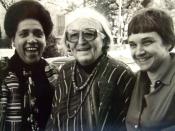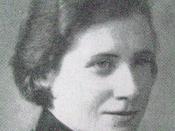In Alice Walker's The Color Purple, the act of naming illustrates power. Those who name have the power; those who are named are essentially powerless. The novel is centered on a small group of blacks in the South. The blacks are powerless to society at large and are given the name of nigger. As powerless as they were, the characters in the story participated in naming in order to feel some sense of power. Naming transformed the people into symbols of the "Other." Everyone in Walker's novel needed an "Other" in order to make themselves feel better. As Simone De Beauvoir states, "Otherness is a fundamental category of human thought (48)." For Celie, Mr. _____ was her "Other." Mr. _____ was a symbol of the patriarchal heterosexuality that has subjugated and determined her life. For this reason he has no name; he isn't a person to her, he is a symbol.
When Celie discovers her own identity, she begins to see Mr.'s ____ identity as well. It is then that he becomes Albert to her.
Celie's transformation from symbol to person emphasizes the implications of naming. Celie has been named by everyone all of her life. Her father has named her "spoiledâ¦uglyâ¦not smart (Walker, 9)" but claims her redemption lies in her man-like work skills. Celie's father continues to degrade her and treat her as a commodity by telling Mr.____ that he can have a cow along with her. Before Mr. ______ makes his decision to marry Celie, he asks her father, "That cow still coming? (Walker, 12)" In this social structure, "woman exists only as an occasion for mediation, transaction, transference between man and his fellow man (Irigaray, 193)." Celie begins to change when she is given the name of "caretaker" for Shug. It is during this time...


